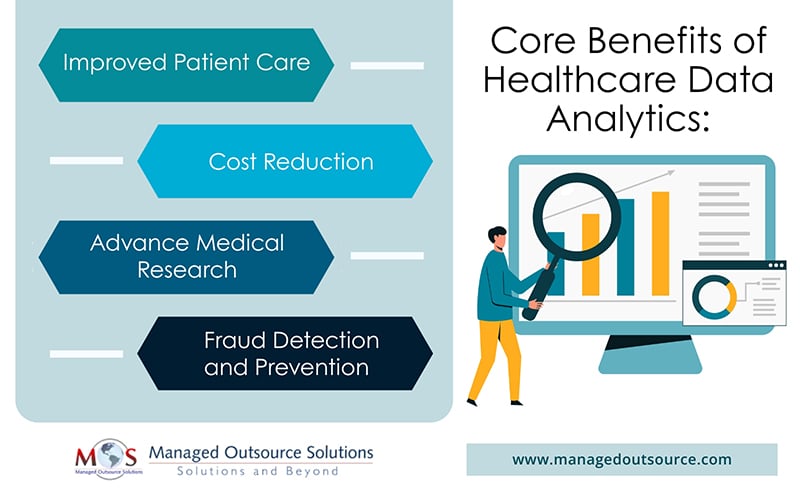From clinical operations and billing processes to research activities and remote monitoring devices, the healthcare sector generates massive amounts of data daily. Medical organizations can leverage this wealth of information to unlock the key to more efficient systems, personalized treatments, and reduced costs. In the increasingly digitized world, the role of data analytics in healthcare is no longer an optional enhancement for practices as it has become a core aspect that determines how care is delivered. Health systems can collaborate with an outsourcing company specializing in information analytics to perform accurate analysis and insights for better decision-making.
What Is Data Analytics in Healthcare?
In healthcare, data analytics is the process of collecting, organizing, and analyzing raw facts from diverse sources into actionable insights. These insights can guide decision-making across a range of healthcare functions, from clinical and operational to administrative and financial processes. Data analytics specialists utilize information from various sources such as electronic health records (EHRs), medical imaging, and sensor data from wearable devices to identify trends, forecast outcomes, and optimize financial performance.
This process relies on a variety of techniques, including artificial intelligence, machine learning, and statistical analysis to interpret complex information and drive informed decisions. Given the diversity of healthcare information sources, analytics is typically divided into four major categories:
- Descriptive analytics: This foundational type of analytics examines historical data to uncover trends and patterns from past activities. For instance, it can highlight the common causes of readmissions or track patient outcomes over time. By providing a clear picture of what has happened, this type helps organizations benchmark their performance over time.
- Predictive analytics: It relies on statistical algorithms and machine learning to analyze historical events and predict future outcomes. For example, it can predict patient deterioration or identify individuals at risk for certain diseases before symptoms appear.
- Prescriptive analytics: This method uses information from both descriptive and predictive types to recommend treatment strategies for optimal patient outcomes. For example, it may involve choosing the most appropriate diet plans for diabetic patients.
- Diagnostic analytics: Often used alongside predictive models, this type helps to determine underlying causes of medical conditions. By examining both historical and real-time occurrences, it helps clinicians understand why certain treatments aren’t working, the root cause of complications, or recurring symptoms.
Key Benefits of Using Data Analytics in Healthcare
Integrating information analytics into healthcare systems is revolutionizing the medical industry by providing the following benefits:
- Improved Patient Care
One of the most significant advantages of analytics in healthcare is the potential for enhanced and timely patient care. By analyzing patient medical histories, clinical records, and real-time data from monitoring devices, healthcare professionals can detect early signs of diseases. Identification of high-risk patients also enables proactive intervention, helping to prevent complications before they arise.
Furthermore, analytics supports the creation of personalized healthcare treatment plans. With insights drawn from individual health records, healthcare providers can tailor treatments to match each patient’s unique needs, improving health outcomes and patient satisfaction.
- Cost Reduction
Healthcare is expensive to operate due to high equipment costs, complex billing systems, labor-intensive staff, and procedural inefficiencies. These factors collectively contribute to financial strain for many healthcare providers. Analytics provides a way to significantly reduce overhead expenses and optimize operations. Identification of inefficiencies and bottlenecks allows for smarter resource allocation, eliminating redundant procedures and improving scheduling processes.
For example, predictive models can help hospitals manage patient flow more effectively, while prescriptive models can optimize staff workflows to avoid overwork and underutilization. Moreover, data-driven decision-making can lead to more accurate billing, reducing errors that can result in lost revenue or claim denials.
- Advance Medical Research
From clinical trials to genomic studies, research in medicine generates vast information which cannot be analyzed manually by researchers. Medical research analytics tools can uncover new insights that lead to breakthroughs in medicine as they are designed to process massive datasets beyond human capacity.
By analyzing clinical trial results and public health data, researchers can track outbreaks across sample sizes, accelerate drug discovery, and evaluate new treatment effectiveness. This could allow authorities to identify new patterns in disease progression, analyze demographic data for high risk groups, and design interventions targeted at specific communities.
- Healthcare Fraud Detection and Prevention
Healthcare fraud is a major issue that can lead to significant financial losses and undermine patient’s trust in the healthcare organization. Data analytics is essential for detecting and mitigating fraudulent financial activities in the health system. By analyzing billing patterns, patient records, and claims details, analytics can uncover irregularities that suggest fraud, such as overbilling, falsified records, or unnecessary treatments.
Advanced algorithms and machine learning tools can spot these anomalies in real time, allowing healthcare providers to take swift action to prevent further losses. By improving fraud detection, medical billing analytics helps protect healthcare resources, ensuring they are used where most needed.
Key Challenges in Implementing Data Analytics in Healthcare Systems
While the benefits are substantial, healthcare organizations face several significant challenges when implementing data analytics. Here are some of the key challenges affecting the medical industry:
- Privacy concerns: As healthcare deals with sensitive and private information, protecting it against unauthorized access is a legal and ethical necessity. Medical professionals are mandated by HIPAA regulations to maintain patient privacy, and breaches can lead to severe consequences. Healthcare organizations must implement robust security measures such as encryption and access controls to secure health data while ensuring it remains accessible to those who need it.
- Data integration: Healthcare information tends to be fragmented and stored in different formats across a range of systems. Integrating this data from multiple, often incompatible systems into a cohesive, usable format can be time-consuming and complex. To address these issues, healthcare providers must focus on implementing robust data governance and cleaning practices. Maintaining data integrity is essential for effective analytics and informed decision-making.
- Adoption and training: Healthcare staff may resist adopting new technologies if they’re not properly trained or equipped with the right skills to use analytics tools. They may also be hesitant to adopt new systems due to concerns about cost, complexity, or disruption to existing workflows. Organizations can overcome this challenge by providing ongoing training to ensure they stay current with the best practices and advancements, making the transition smoother.
Ensure Data-driven Success with Outsourcing
Data analytics plays a central role in determining how medical practices administer and deliver care. By partnering with data processing services, healthcare organizations can improve diagnostic accuracy, reduce operational costs, and enhance decision-making processes both on the frontlines and back offices. Outsourcing data processing tasks provides access to specialized expertise, allowing healthcare providers to focus on patient care while analytics professionals refine the collection, analysis, and application of data. This allows them to achieve a new level of operational efficiency, improve patient outcomes, and drive financial success.





